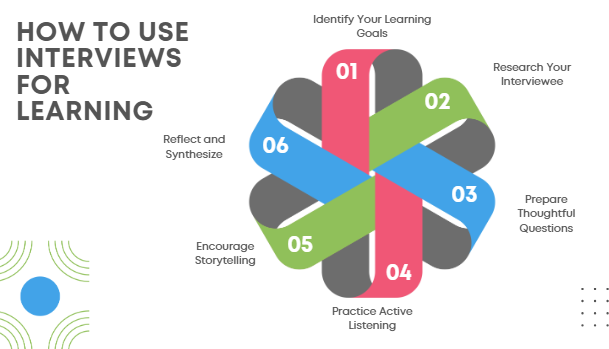
To maximize the benefits of using interviews as a learning tool, it’s important to approach the process with intention and structure. Here’s how to effectively use interviews for learning:
1. Identify Your Learning Goals
Before conducting an interview, it’s crucial to identify your learning objectives. Are you looking to gain practical advice on a specific subject, understand a new perspective, or clarify complex concepts? Defining your goals will help you formulate the right questions and choose the most appropriate interview subjects.
– For example, if you’re studying business and want to understand leadership styles, you might interview successful leaders from different industries. If you’re learning about a historical event, speaking to a historian or individuals with firsthand experience will provide valuable context.
2. Research Your Interviewee
To make the interview as productive as possible, do your homework. Research your interviewee’s background, expertise, or experiences. This preparation not only helps you ask more informed questions but also demonstrates respect for the interviewee’s time and knowledge.
– For example, if you are interviewing a scientist, familiarize yourself with their research so you can ask specific questions that go beyond general knowledge and get into the nuances of their work.

3. Prepare Thoughtful Questions
The quality of your interview largely depends on the questions you ask. Thoughtful, open-ended questions lead to richer conversations and deeper insights. Instead of asking questions that elicit “yes” or “no” answers, frame your inquiries to encourage storytelling, reflection, and explanation.
– Examples of effective questions:
– “What inspired you to pursue your career in this field?”
– “Can you walk me through a specific challenge you faced and how you solved it?”
– “What common misconceptions do people have about this subject?”
Having a list of prepared questions will guide the conversation, but also be flexible enough to explore unexpected topics that may arise.
4. Practice Active Listening
While it’s important to have questions prepared, listening is the key to a successful interview. Active listening means fully concentrating on what the interviewee is saying, rather than thinking about the next question. By doing so, you can ask meaningful follow-up questions and delve deeper into interesting points.
– Follow-up questions like “Can you elaborate on that?” or “Why do you think that is important?” often lead to valuable insights that weren’t anticipated.

5. Encourage Storytelling
Stories are powerful vehicles for learning. They provide context, emotion, and real-world applications of abstract ideas. Encourage your interviewee to share personal stories or experiences that relate to the topic. This not only makes the conversation more engaging but also helps you remember and internalize the information.
– For example, if you’re learning about entrepreneurship, asking the interviewee to describe a key moment of failure or success in their journey can provide more actionable lessons than theoretical explanations.
6. Reflect and Synthesize
After the interview, take time to reflect on what you’ve learned. Revisit your initial learning goals and see how the conversation helped you address them. Organize your notes and consider how the new information fits into the broader context of your study or project.
– Reflective questions to ask yourself:
– What were the key takeaways from the interview?
– How did this interview change or enhance my understanding of the topic?
– What further questions do I now have, and how can I explore them?
Synthesizing the information is critical to transforming the interview from a one-time conversation into lasting knowledge.




Comments are closed